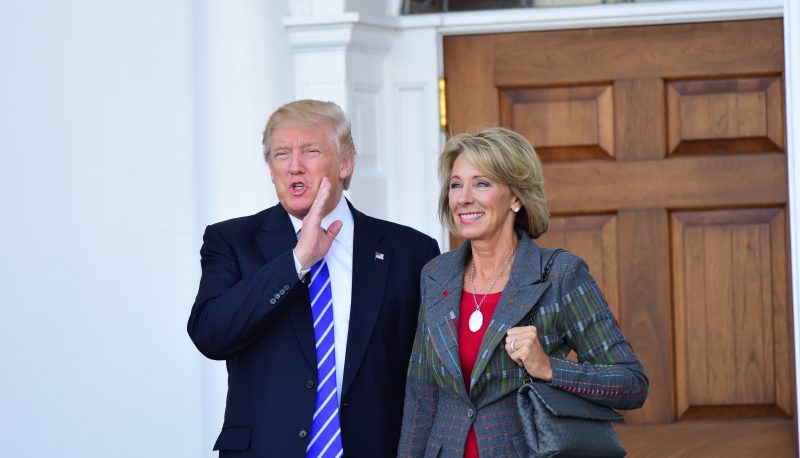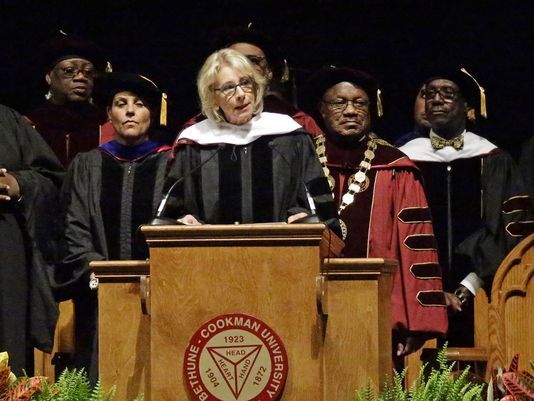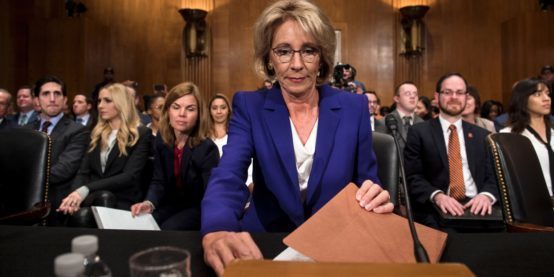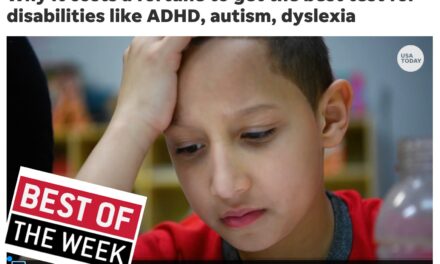Last year, the national media basically lost its shit over Trump education secretary Betsy DeVos. Twelve months later, it’s not nearly clear as it should be that the coverage is getting better.
By Alexander Russo
A year ago this week, Betsy DeVos’s confirmation hearing turned into an infamous debacle. The nominee stumbled and stammered her way through the Senate HELP committee proceedings. Critics and their allies jumped at the chance to label her incompetent and uninformed.
Quite understandably, a handful of news outlets have used the occasion to look back at that much-discussed moment.
But the anniversary also gives us a chance to look back at how well the national education media did covering DeVos during that period — as well as during the intervening months since then.
A look back suggests that at DeVos coverage over the past year has too frequently been superficial and over the top, stretching the limits of fairness and impartiality. And there have been some chronic blind spots. But slowly, DeVos coverage seems to be steadying out. Crossed fingers things improve even more in 2018.

Trump announces EdSec nominee Betsy DeVos
As you may recall, national coverage of DeVos got off to a rocky start. There were more than a few deeply flawed stories like How Trump’s Education Nominee Bent Detroit to Her Will on Charter Schools in the New York Times. (One favorite line: “A believer in a freer market than even some free market economists would endorse, Ms. DeVos pushed back on any regulation as too much regulation.”)
As I wrote at the time, the Times and other national outlets “cherry-picked storylines that put DeVos in a negative light and [wrote] about DeVos’s ideas and efforts using fraught, charged language.”
While the errors were diverse in their specifics, the underlying problem was common: “Readers deserve to know what’s going on behind the scenes, not just the onstage play-by-play.”
These kinds of errors and blind spots would not resolve quickly.
Next came the nomination hearing. My take: Poorly as she performed, DeVos was not the wildly incompetent person she was portrayed to be at that time.
Cable news went to town, but the news coverage from outlets like the Times (Nominee Betsy DeVos’s Knowledge of Education Basics Is Open to Criticism) and the Post (DeVos clears procedural hurdle in Senate, setting up tight final vote) was actually relatively restrained.
Still, startlingly little attention was given to why she had been kept sidelined by the White House during all those weeks, why she might have been misled into preparing poorly for the event, or how Senate Republican attempts to protect her backfired by angering Democratic members who were about to question her.


NYT and Washington Post headlines about the DeVos confirmation process.
When it came time for DeVos’s confirmation vote the following month, the coverage quality deteriorated again. Several top media outlets highlighted the surface drama of the situation – the phone calls being made, the emails – without getting at much of the political dynamics going on beneath the surface that kept her confirmation from being in any serious doubt. There were lots of stories with headlines like The popular uprising that threatens the Betsy DeVos nomination (from the Washington Post) and Trump’s Pick for Education Could Face Unusually Stiff Resistance (from the New York Times).
Two exceptions come to mind: Just before the vote took place, Slate’s Jim Newell explained why Democrats never really had a chance of knocking DeVos off. Shortly, after, the Washington Post’s Chris Cillizza reported how “The drama over whether DeVos was going to be confirmed wasn’t drama at all.”
What a shame so few readers of major news outlets had much of a sense of what was really going on besides the circus show that was being put on.

The pattern continued into the spring. Coverage of the DeVos appearance at a historically black university graduation ceremony exhibited a lack of familiarity with HBCUs and a focus on spectacle over substance, according to a Joe Williams column for The Grade:
“Most of the journalists covering the spectacle of Betsy in the Lion’s Den missed a bigger, arguably more important story behind the scenes. That story hinged on a question almost no one asked: Why was DeVos invited, why did she accept, and what, exactly, was the purpose of her appearance?”
In the nine months then, coverage of DeVos has gotten better, though not consistently.
Journalists seemed surprised in June when DeVos criticized charter schools at the national charter school conference, despite her having expressed similar views many times in the past.
Profiles in The Guardian and New York magazine published in July failed to give much new insight into the Trump appointee. (Both made The Grade’s “worst of the month” list.)
It somehow took until September for a national journalist to report on DeVos’s five year-stint as a district school tutor – one of the most obvious and important aspects of DeVos’s education resume.
Then, in October, the New York Times wrote about DeVos’s work schedule in ways that were unfair and unhelpful to readers, presenting DeVos’s calendar as if she was holding meetings and attending events that were inappropriate, without giving readers any sense of how her predecessors had been scheduled. A USNews story on the same topic noted that the DeVos calendar didn’t unearth “anything unusual or unexpected.”
In just the past few months, news outlets including NPR, AP, the Washington Post, and the New York Times stood by when an easily-reported rumor that DeVos was about to resign went viral. What’s worse than covering DeVos poorly? Not covering her story at such a key moment.
In the nine months then, coverage of DeVos has gotten better, though not consistently.
To be sure, DeVos and her team have contributed to the problem, failing to give reporters access to her schedule and making it hard to get timely responses from USDE officials. It wasn’t until July that DeVos sat down for a question-and-answer session with education reporters. And there have been several instances in which the DeVos-run Education Department has warranted critical coverage. Most obviously, her oversight of state ESSA plans has been inconsistent.
It’s important to note that there has been some standout coverage of DeVos along the way, including New York Times education reporter Erica Green’s two big pieces (Charter School Founded by DeVos Family Reflects National Tensions and To Understand Betsy DeVos’s Educational Views, View Her Education), the This American Life segment about her time as a school reading tutor, the recent Politico profile by Tim Alberta about her settling-in process, and pretty much everything I can think of that US News’ Lauren Camera has written about DeVos. Though they don’t cover her very closely, NPR’s DeVos coverage has generally been of admirable quality, too.
In addition, there have been at least a couple of journalists who wrote about or otherwise expressed concerns about how DeVos has been portrayed. Early on, NPR’s Anya Kamenetz addressed the possibility that sexism was part of the reason DeVos was being criticized so relentlessly by opponents (and took a lot of heat for including that perspective). While he was still at The 74, Matt Barnum noted some of DeVos’s efforts in Detroit actually addressed the hot-button issue of charter accountability, which others such as the NYT’s Kate Zernike had downplayed. Barnum also wrote a timely takedown of the DeVos resignation rumor for Chalkbeat.
I did not expect to spend nearly as much time during 2017 criticizing DeVos coverage that seemed inaccurate, unfair, or unhelpful. It wasn’t what I’d set out to do, and it certainly wasn’t comfortable… But there was a need.
A year later, DeVos is – surprise! – still on the job, and doesn’t seem to be going anywhere anytime soon. Last week, the DeVos-run US Department of Education told the state of Texas it had to improve its special education services. This week, it approved a slew of state plans to conform with the loosey-goosey law known as ESSA.
I’ve written or commissioned six pieces about DeVos coverage over the past year (see them listed at the bottom). I did not expect to spend nearly as much time during 2017 criticizing DeVos coverage that seemed inaccurate, unfair, or unhelpful. It wasn’t what I’d set out to do, and it certainly wasn’t comfortable. Criticizing coverage of DeVos can seem awfully close to defending her. But there was a need. Unfair coverage needs to be called out, no matter on which side it occurs.
One of my biggest hopes for 2018 is that DeVos coverage will be smarter, deeper, less cartoonish than it has been in the past. Let critics and advocates bash her all they want. They have no shortage of ways to get the word out on their own. March, vote, and #resist on your own time (if your newsroom allows it). But that’s not what we need you to do as a reporter or editor. We need you to ask hard questions, look below the surface, give readers some context they might not otherwise be aware of, and treat DeVos no better or worse than you’ve treated her predecessors.
Related columns
DeVos Confirmation: The Cliffhanger That Wasn’t
Why DeVos Commencement Coverage Was So Basic
Growing Tensions Between DeVos Education Department & Reporters
‘No access’ to Betsy DeVos? No problem
How the DeVos resignation rumor went viral – and what to do next time
ABOUT THE AUTHOR

Alexander Russo
Alexander Russo is founder and editor of The Grade, an award-winning effort to help improve media coverage of education issues. He’s also a Spencer Education Journalism Fellowship winner and a book author. You can reach him at @alexanderrusso.
Visit their website at: https://the-grade.org/












